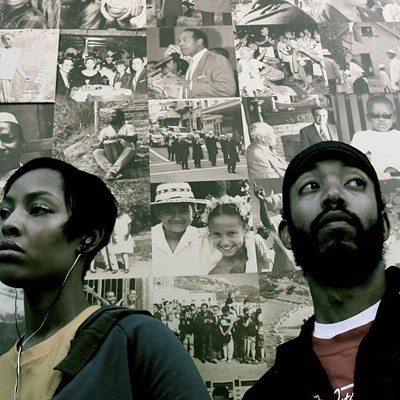Locally speaking, Calexico, abetted by Mariachi Luz de Luna, kick off the disc with a typically ebullient, IMAX-sized version of the elusive "All Across the Wire," recorded during a KXCI radio session, in May of this year. The sadly departed Rainer (who surely would have embraced the Bread, Soup & Struggle project wholeheartedly, were he around to see it) is represented by a stomping live version of "Helping Hand," recorded at Club Congress, in 1988, donated by Patti Keating, his widow.
The remainder of tracks by locals were recorded by project organizer Rich Hopkins on his digital tape recorder, at a variety of locations (offices and living rooms feature prominently), in an effort to accommodate the participants. Accordingly, these tracks have an earthy feel that only serves to underscore the disc's mission. Felipe Jarra's reading of the traditional "Acamabe de Matar" sounds like an unearthed treasure from a Mexican collection compiled by Harry Smith or Neil Lomax, if such an album actually existed, while Howe Gelb's sparse piano 'n' voice reading of Johnny Cash's "What on Earth Will You Do (For Heaven's Sake)?" makes the room in which it was recorded (somewhere in Howe's house) figure almost as prominently in the finished product as Gelb's contributions. Stefan George's "Workingman's Blues" is a standout, with his gorgeous slide work, picking, and wooly-blanket voice, which intones, "A stranger's eyes, they offer only pity/When a working man can't make enough to live."
And the contributions from out-of-towners are no mere throwaways, either. Former Country Joe and the Fish guitarist Barry Melton could hold his own with just about anyone boasting alt-country cred these days, with his Nashville Skyline-esque "Can't Live on Love Alone," while his former bandmate, Country Joe McDonald weighs in with some meaty slide guitar on the surprisingly Rainer-like "Nothing Means Nothing." And Dream Syndicate and Wavelab Studios vet Steve Wynn tosses in a nifty live version of "The Blue Drifter," from his 1990 solo debut, Kerosene Man.
The fact that there's truly not a dud in the bunch only makes Casa Maria catholic worker Brian Flagg's spoken-word track, untitled but listed as "a) a poem by Father Berrigan; b) in his own words" all the more remarkable. One might think a "spoken-word" piece by a guy who toils away at the soup kitchen this CD is benefiting might be completely superfluous, but one would be wrong. Flagg comes off as a genuinely inspiring, pissed-off liberal at a time when they're in short supply. (And lest you think "liberal" is the dirty word you've been brainwashed to believe it is lately, as my mom used to say, go look it up in your Funk 'n' Wagnalls.) The urgency in Flagg's voice as he quotes Father Berrigan's poem, or restates the Catholic worker mission statement, as described by Dorothy Day--"to comfort the afflicted, and at the same time afflict the comfortable"--or provides a heartfelt stance on "the works of mercy vs. the works of war," is undeniable, and goes a long way toward understanding what Flagg must witness and experience down at Casa Maria every day.
Of course, the fact that as soon as Flagg closes his passage with a humble "Amen," the familiar voice of Rainer chimes in with, "Go find the people who are lost, give them a helping hand," doesn't hurt either.
"Bread, Soup & Struggle: A Tribute to Casa Maria; Tucson, Arizona" is available at CD City, Bentley's Coffee, Hear's Music, PDQ Records, Zia Records and Borders. The disc will also be available at the CD release party for $10. See the Soundbites column in this issue for more information.






